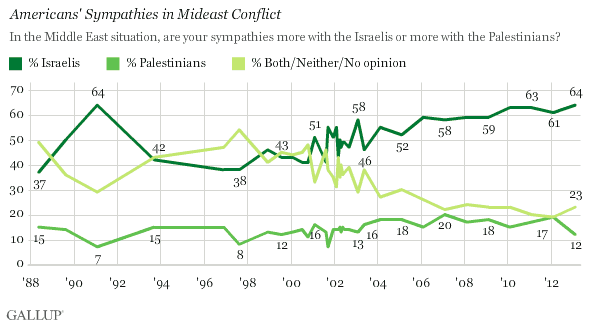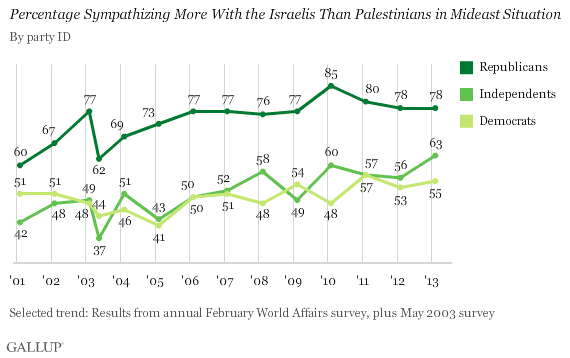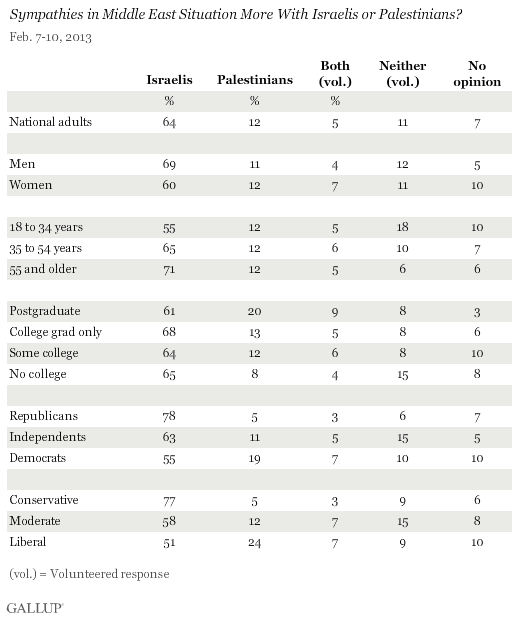PRINCETON, NJ -- As President Barack Obama prepares to visit Israel, the Palestinian West Bank, and Jordan next week -- his first trip to the region as president -- Americans' sympathies lean heavily toward the Israelis over the Palestinians, 64% vs. 12%. Americans' partiality for Israel has consistently exceeded 60% since 2010; however, today's 64% ties the highest Gallup has recorded in a quarter century, last seen in 1991 during the Gulf War. At that time, slightly fewer than today, 7%, sympathized more with the Palestinians.

The new data are from Gallup's 2013 World Affairs poll, conducted Feb. 7-10.
One of the more notable aspects of the trend is the steady increase in relative support for Israel over the past decade, at the same time that the percentage with no opinion or favoring neither side has declined. Preference for the Palestinians has been relatively flat, generally in the mid- to high teens, before this year.
Republicans Remain Most Staunch in Support for Israel
Consistent with prior years, Republicans are substantially more likely than Democrats to favor the Israelis, 78% vs. 55%, with the preferences of independents -- currently 63% -- more closely matching those of Democrats.
Support for Israel has increased among all three party groups since 2001, but particularly among Republicans and independents. The percentage sympathizing more with the Israelis has increased by 18 percentage points among Republicans (from 60% to 78%) and by 21 points among independents (from 42% to 63%). By comparison, Democrats' support has increased four points (from 51% to 55%).
Republicans' sympathy with Israel spiked to 77% in February 2003, likely associated with the run-up to the Iraq war, when Israel supported U.S. aspirations to remove Saddam Hussein from power. It sank sharply in a subsequent poll in May, but then returned to the high 60s in 2004.

Majorities of all political as well as major demographic groups in America say they sympathize more with the Israelis than the Palestinians -- with minor variations by gender, age, education level, and political orientation. Liberals and Democrats are the least likely to sympathize with Israel, and conservatives and Republicans are the most likely.
Older Americans are more likely to support Israel, with sympathy rising from 55% among 18- to 34-year-olds to 65% among 35- to 54-year-olds, and to 71% among those 55 and older. However, the diminished support among younger adults reflects higher proportions with no opinion or saying they favor neither side. Twelve percent of each age group favors the Palestinians.
The pattern differs somewhat by educational background, in that fairly similar levels -- between 61% and 68% -- of adults in all major educational groups favor Israel. At the same time, the percentage favoring the Palestinians increases with formal education, ranging from 8% of those with no college experience to 20% of postgraduates.

Bottom Line
Americans' sympathy for Israel is at a high-water mark as President Obama travels there for what is being described as a "maintenance" visit, not a high-stakes effort to restart the Palestinian-Israeli peace process. Consistent with attitudes in the past decade, Republicans are significantly more supportive of Israel than are Democrats, although the majority of all party groups tilt toward Israel.
Younger Americans show less favoritism toward Israel than middle-aged adults and, in particular, seniors; however, they are no more likely to favor the Palestinians. They are simply less anchored about whom they favor. Palestinians receive the highest sympathy from Democrats, liberals, and postgraduates, but even among these, support tops off at 24%.
Survey Methods
Results for this Gallup poll are based on telephone interviews conducted Feb. 7-10, 2013, with a random sample of 1,015 adults, aged 18 and older, living in all 50 U.S. states and the District of Columbia.
For results based on the total sample of national adults, one can say with 95% confidence that the maximum margin of sampling error is ±4 percentage points.
Interviews are conducted with respondents on landline telephones and cellular phones, with interviews conducted in Spanish for respondents who are primarily Spanish-speaking. Each sample of national adults includes a minimum quota of 50% cellphone respondents and 50% landline respondents, with additional minimum quotas by region. Landline telephone numbers are chosen at random among listed telephone numbers. Cellphones numbers are selected using random digit dial methods. Landline respondents are chosen at random within each household on the basis of which member had the most recent birthday.
Samples are weighted to correct for unequal selection probability, nonresponse, and double coverage of landline and cell users in the two sampling frames. They are also weighted to match the national demographics of gender, age, race, Hispanic ethnicity, education, region, population density, and phone status (cellphone only/landline only/both, cellphone mostly, and having an unlisted landline number). Demographic weighting targets are based on the March 2012 Current Population Survey figures for the aged 18 and older U.S. population. Phone status targets are based on the July-December 2011 National Health Interview Survey. Population density targets are based on the 2010 census. All reported margins of sampling error include the computed design effects for weighting.
In addition to sampling error, question wording and practical difficulties in conducting surveys can introduce error or bias into the findings of public opinion polls.
View methodology, full question results, and trend data.
For more details on Gallup's polling methodology, visit www.gallup.com.
